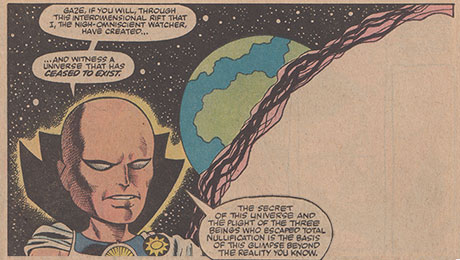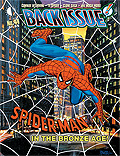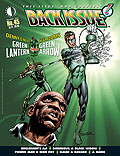
Tales of Asgard -- Journey Into Mystery #100 (from the Tales of Asgard tpb)
"The Storm Giants"
Stan Lee-Jack Kirby/Paul Reinman
Doug: I know we've only done three of these reviews (and I've enjoyed reading and reporting on all three), but it seems like it's about time we got to seeing Thor and Loki! Well wait no longer, friends! Today is a really neat tale, for me very reminiscent of Jack & the Beanstalk.
 Karen: Somebody definitely had their book on Norse mythology handy! I recall reading about Thor and Loki dealing with giants in just this same manner when I was into mythology as a kid.
Karen: Somebody definitely had their book on Norse mythology handy! I recall reading about Thor and Loki dealing with giants in just this same manner when I was into mythology as a kid.Doug: I don't think it says, but I'd guess that in this story Thor and Loki are around 11-12 years old. They are off on a mission, and it's not clear if they've been sent or are on their own -- my guess is that they've gone off so that Thor can be a hero -- in a spin borrowed from Greek mythology, in order to inherit the hammer of Odin Thor must perform many deeds of valor. These "untold tales" are really a lot of fun, and Stan and Jack did a great job of taking what they'd already built up in terms of characterization and showing us some foundational elements to the then-present. Here we see the brash Thor and the crabby Loki on a mission into the castle of storm giants, to retrieve the golden apples of Iduna, which have been stolen. Say, did you happen to notice a no-prize worthy misplacement on a word balloon on the second page? Stan obviously wasn't paying any attention to Jack's pencils when he dialogued it.
Karen: Thor's awfully cute with his little page-boy haircut. The twosome's personalities are already set.
Doug: Opportunistic Loki is having none of Thor's mission. First chance he gets, he shoves Thor from their hiding place, into full view of the storm giants. They quickly identify him as an Asgardian, but Thor is not one to cower. He in turn threatens them, and it's game on. Thor's strength, at such a young age, is unbelievable yet makes for some great images. Wielding a sword, he hacks through one of the table legs and immediately follows that with an assault with... pepper. This is fun!

Karen: I laughed out loud when I saw Thor riding that pepper shaker! This was just good, fun stuff, and imaginative as heck. I bet Kirby was having a blast.
Doug: It was only a matter of time before the giants turned the tide, and at that moment Loki stepped in to save the day. Pushing a pile of wet leaves (were these just laying around the castle?) into the fireplace, the room fills with acrid smoke (was the flew not open?). Thor uses the distraction to free himself from the giant's grip, before Thor runs after Loki.
Doug: The godlings make their way to one of the ramparts, where the apples are stored atop a giant bald eagle. Loki leaps atop the bird and threatens to leave Thor behind. As the giants approach, Thor's having none of Loki's scheme, so slashes the bird's tethering and away they go.
Karen: Even as a kid, Loki was nothing but trouble! I love how the virtuous Thor automatically assumes that Loki was trying to help him by setting those leaves on fire. Of course Loki reveals his true motives in the next instant.
Doug: Of course when they return to the throne room it's Thor who is praised by the Allfather, while Loki does his usual slow burn. And what of the hammer Mjolnir? Almost... Thor can almost lift it.


















































3 comments:
These are lots of fun and pretty distinct from the usual Silver Age superhero fare. Seems clear that Kirby became far more enthused with the main series when he was able to incorporate more of these mythic elements into the stories, as well as being able to stretch them over several issues. It also helped when they finally ditched the variation of the Superman/Lois Lane/Clark Kent triangle by letting Jane Foster in on Thor's secret and ultimately switching her out for Sif.
BTW, bringing up the ages of Thor & Loki in this tale prompts the question did they age in Midgardian time or were they already several Midgardian centuries old when they appeared to be about the age of a typical American 6th grader? Guess it all depends on who's telling the story.
Hi Fred,
I do think that Tales of Asgard is significant in that it created a much richer back story for Thor -incorporating the myths and expanding the Asgard cast. It helped to separate Thor from other super-heroes.
Regarding the Thor/Blake/Jane Foster triangle, I interviewed Gerry Conway last week and asked him about that and the relevancy of Don Blake. He seemed to feel the Thor-Jane relationship was impossible (which Stan seemed to confirm by dumping her). He also felt that once Stan revealed that Blake was simply a creation of Odin and not a real person, he was meaningless. That, and the fact that Jane had been written out, and there was no real Earth-bound cast to speak of, led to Blake pretty much disappearing during his run, and in many later ones.
Personally, I've never seen the need for Blake. But I'd be curious to hear others opinions.
Karen
I agree, Karen, that the Donald Blake persona became meaningless once Jane Foster was written out, and even before that his appearances in the series were becoming ever rarer -- he was mostly absent during the long storyline involving Hercules & Pluto. Certainly Blake wasn't integral to the series in the way Peter Parker was in Spider-Man or even Clark Kent in Superman, mainly because while Clark & Peter are links to a significant supporting cast, Donald only linked to Jane, and she was rather boring and one-dimensional. Thor, himself, however, grew to link to a substantial supporting cast of other Asgardians, and really perked up with the addition of the Warriors Three and even Balder added some pathos -- a genuinely nobel best friend beset by feelings of envy, jealousy and shame but remains a true friend.
Blake served a purpose in the early stories, of providing a touch of humility to the mighty thunder god, not to mention a bit of homage to the original Captain Marvel but later seemed increasingly silly -- after all, can any real doctor keep a practice going when he's regularly absent for months at a time? Who would work for him and what patients would rely on him?
Post a Comment